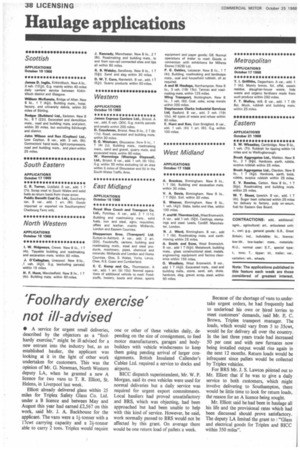'Foolhardy exercise' not 17I-advised
Page 40

If you've noticed an error in this article please click here to report it so we can fix it.
• A service for urgent small deliveries, described by the objectors as a "foolhardy exercise," might be ill-advised for a new entrant into the industry but, as an established haulier, the applicant was looking at it in the light of other work undertaken for customers. This was the opinion of Mr. G. Newman, North Western deputy LA, when he granted a new A licence for two vans to T. R. Elliott, St. Helens, in Liverpool last week.
Elliott already delivered glass within 25 miles for Triplex Safety Glass Co. Ltd. under a B licence and between May and August this year had earned £2,567 on this work, said Mr. J. A. Backhouse for the applicant. The vans were a lt-tonner with a 17cwt carrying capacity and a 2-I--tonner able to carry 2 tons. Triplex would require one or other of these vehicles daily, depending on the size of consignment, to feed motor manufacturers, garages' and bodybuilders with vehicle windscreens to keep them going pending arrival of larger consignments. British Insulated Callender's Cables Ltd. required a service to docks and airports.
BICC dispatch superintendent, Mr. W. P. Morgan, said its own vehicles were used for normal deliveries but a daily service was required for urgent export commitments. Local hauliers had proved unsatisfactory and BRS, which was objecting, had been approached but had been unable to help with this kind of service. However, he said, work normally passed to BRS would not be affected by this grant. On average there would be one return load of pallets a week. Because of the shortage of vans to. undertake urgent orders, he had frequently had to underload his own or hired lorries to meet customers' demands, said Mr. E. C. Brown, Triplex transport manager. The loads, which would vary from 5 to 35cwt, would be for delivery all over the country. In the last three years trade had increased 50 per cent and with new furnaces now being installed output would rise again in the next 12 months. Return loads would be infrequent since pallets would be collected by Triplex vehicles.
For BRS Mr. J. S. Lawton painted out to Mr. Elliott that if he was to give a daily service to both customers, which might involve delivering to Southampton, there would be little time to look for return loads, the reason for an A licence being sought.
Mr. Elliott said he had been in haulage all his life and the provisional rates which had been discussed should prove satisfactory. The deputy LA limited the grant to : "Glass and electrical goods for Triplex and BICC within 350 miles".
















































































































